Early Years Curriculum Summer Term





Welcome to the Early Years Foundation The Den ................................................................................ Areas of learning .................................................................. Topics Specialist Teaching .............................................................. Suggested activities to do at home ...................................... Lower 1 Areas of learning .................................................................. Topics Specialist teaching Suggested activities to do at home ....................................... 3 Contents 06 07 09 11 13 15 16 17 19 21 23
"Every parent wants to be sure their child is safe and happy at school. At Orchard House School, we have small classes, dedicated teachers and an award winning approach to pastoral care that means your child really does come first, always.
We are committed to co education at Orchard House School. Children learn together from the age of 3 to 11. Our excellent academic results see pupils heading to leading senior schools, both in London and beyond, and every year we achieve numerous awards in sport, music, art and drama, plus academic scholarships. It is a given that our pupils will move on to some of the best schools in the country but what matters to us is that they go to the right school for them. Children learn best when they are happy, we commit not only to putting all our energy into providing a happy, safe environment for your children to learn in, but we also ensure our pupils are prepared for the next stage, for the school where they will go on and flourish."
 Mr Kit Thompson Headmater
Mr Kit Thompson Headmater

'Children learn and develop well, in enabling environments with teaching and support from adults, who respond to their interests and needs and help them to build their learning over time.'
Welcome to the Framework for the Early Years Foundation Stage
At

House School we follow the Early Years Foundation Stage Curriculum
We follow the four guiding principles as stated in the Statutory Framework for the Early Years Foundation Stage.
These principles are:
Children learn to be strong and independent through positive relationships
Children learn and develop well in enabling environments with teaching and support from adults, who respond to their interests and needs and help them to build their learning over time
Every child is a unique child, who is constantly learning and can be resilient, capable, confident and self assured
Importance of learning and development Children develop and learn at different rates Children benefit from a strong partnership between practitioners and parents and/or carers
There are seven areas of learning and development that shape our educational programme. All areas of learning and development are important and inter connected.
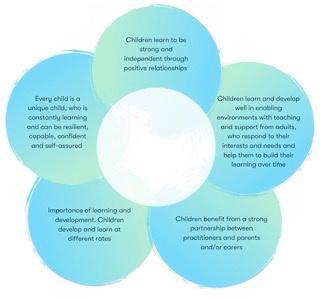
We believe there are three areas of particular importance for building a foundation which ignites children’s curiosity and enthusiasm for learning, forming relationships and thriving
These are the prime areas:
Communication and language Physical development
Personal, social and emotional development
In addition to the prime areas, we support children in the four specific areas of learning, through which the three prime areas are strengthened and applied
The specific areas are:
Literacy Mathematics
Understanding the world
Expressive arts and design
Orchard
6
'OHS children benefit from many aspects of the Montessori curriculum and philosophy'.
OHS children benefit from a continuous provision in the outdoor environment Children’s learning is extended daily in our outdoor area and children enjoy daily outdoor activities throughout the academic year Exploratory play is encouraged in the outdoor area throughout the day.
Our children benefit from many aspects of the Montessori curriculum and philosophy.
For more information about the Early Years curriculum please follow this link https://www.gov.uk/government/publications/early years foundation stage framework

2 7
The Den
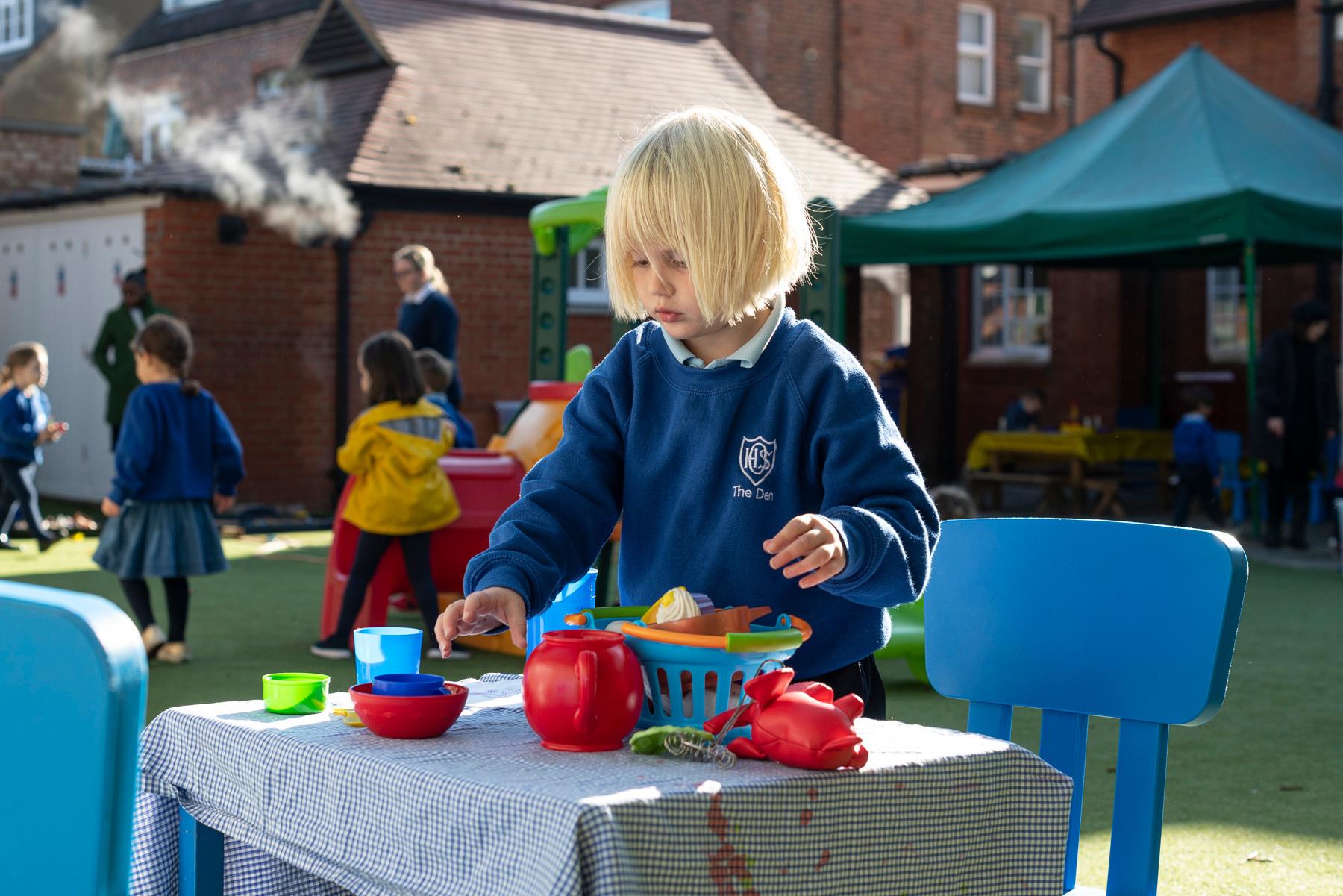

The Den Usingawiderrangeofvocabularyandlearning newvocabulary Questionsandinstructions Rhymesandsongs Listeningandcommunicationskills Developingfinemotorskills Developinggrossmotorskills Cuttingskills Pencilcontrolandpencilgrip Socialcommunicationskills Responsibilityandmembershipofcommunity Exploringfeelings Workingasateam Resolvingconflict MontessoriPeacetable Healthyeating/takingcareofour teeth/exercise GettingreadyforReception(Lower1)class andmeetingmynewfriendsandteachers Exploringarangeoffictionandnonfiction booksanddevelopingcomprehensionand languageskills Syntheticphonics CVCwordbuilding identifyingtheinitial, middleandendsoundsinwords Developingdecodingandblendingskills(CVC words) Finemotordevelopmentactivities pencil controlandpencilgrip Namewriting Letterformationactivities CommunicationandLanguage PhysicalDevelopment Personal,SocialandEmotionaldevelopment Literacy Areas of Learning 8

Countingskills Numberrecognition/ordering/1:1correspondenceactivities Reallifemathematicalnumberproblemswithnumbers 2D/3Dshapeactivities Repeatingpatterns Numberformationactivities Additionandsubtractionactivities Comparinglength/quantity/weight Developingmathematicallanguageskills Diversity Familyandcommunity Growth Naturalworld Minibeasts/Animals Singingarangeofsongs Imaginativeplay Roleplayactivities Exploringtextureandcolour Smallworldactivities developingstorytellingskills Mathematics UnderstandingtheWorld ExpressiveArtsandDesign *AllareasoflearningarereinforcedbyarangeofMontessoriactivitiesfor childrentoselectduringindependentlearningtime 9
Topics
We believe that it is important to follow children’s interests. We plan many activities and lessons around these topics but we also ensure our planning and provision facilitates learning based on each child's individual interests and ideas.
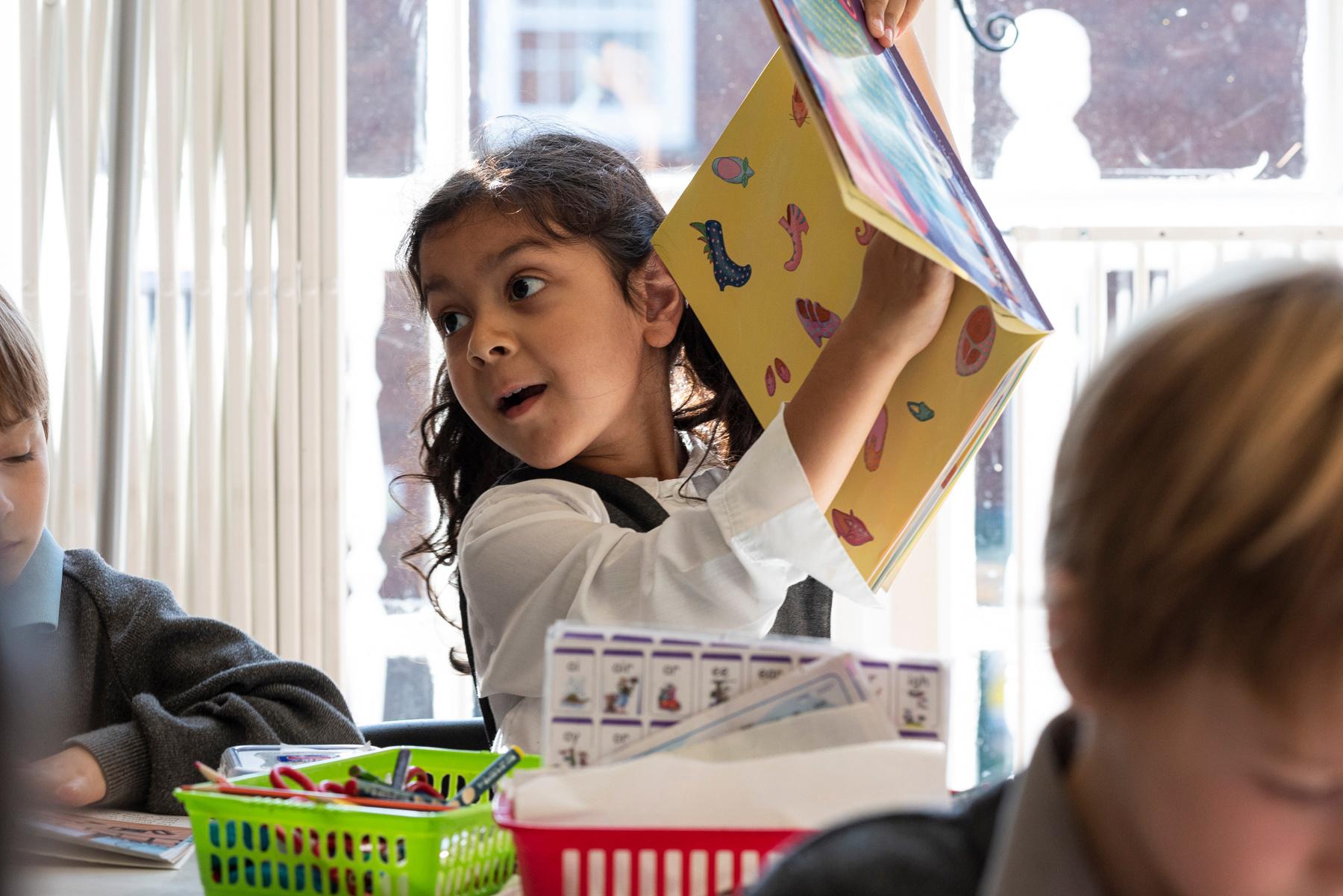
10
In the summer term the topic is ‘Growing’ and ‘Minibeasts’. The children explore a range of activities such as growing vegetables and plants, Minibeast hunts in our school garden and environmental projects.
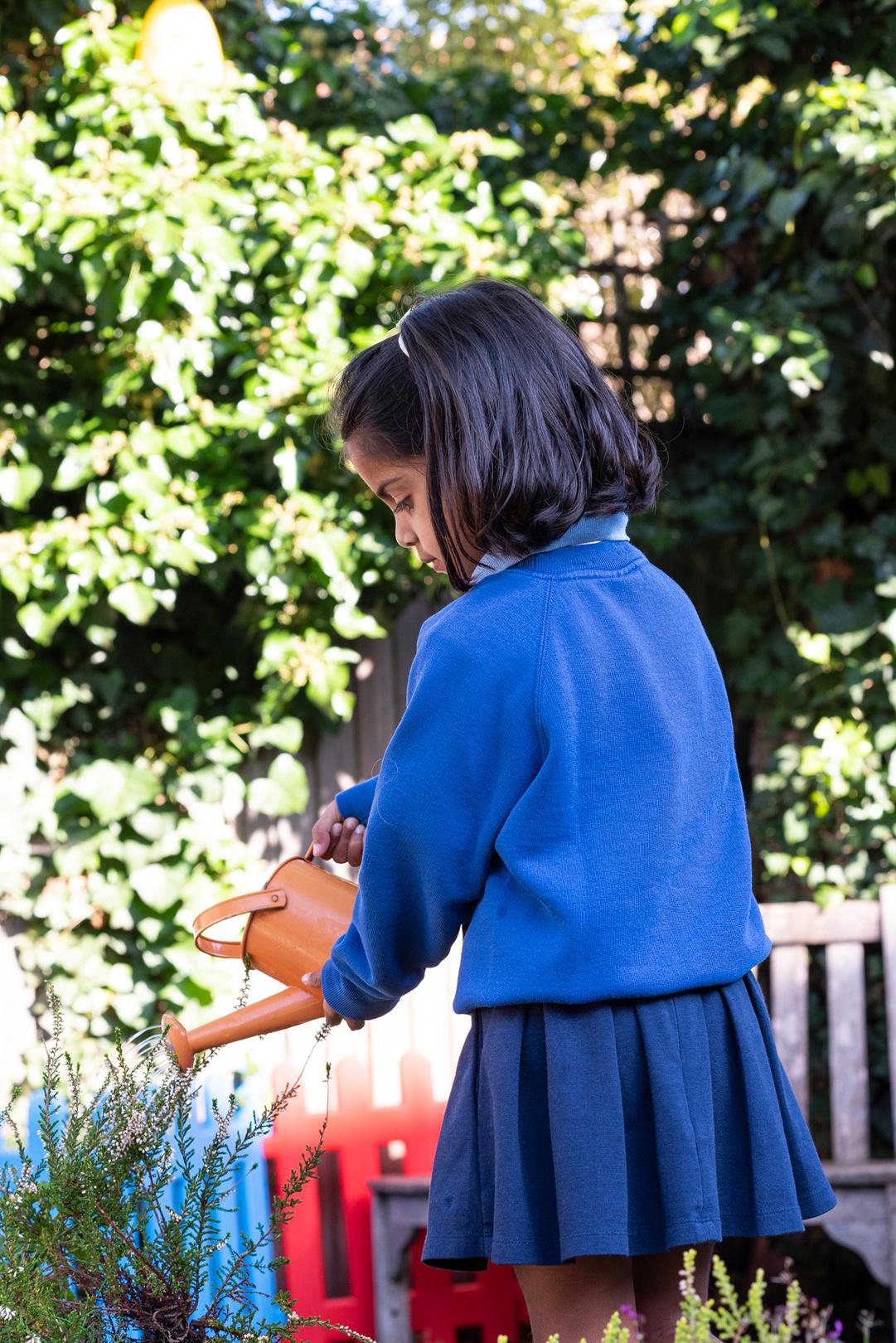
The children will learn about the life cycles of different animals including a butterfly, a frog and a chicken. We will also visit a local animal farm to further explore these topics.
We always strive to give children as many real life experiences as possible in the Early Years.
11

Gamesinpreparationforsportsday Arangeofgrossmotoractivities Agilityskillsandcoordinationskills Listeningandshowingunderstandingthroughactions Embeddingseasonalvocabularyintogames,nurseryrhymes andpicturebooks PhysicalEducation French Specialist Teaching 12
Computing Music/Eurhythmics
Exploring a range of technology toys such as Bee bots

Learning how to complete an educational game on an iPad Using the IWB in lesssons and to support learning
Exploring structure through mathematical singing games, and timbre by looking at musical elements through our senses Movement in response to music
Learning and singing a range of familiar and new songs
13
Suggested activities to do at Home
Holistic learning has many forms at Orchard House School. We believe there are many activities that you could adopt that support and further develop your child's learning when they are not at school. Please find some of our suggestions below:

Sharing stories at home. Talking about books to develop children’s comprehension skills. 1:1 reading time using resources provided by teaching team Drawing pictures
Playdough activities to develop fine motor skills
Role play school. Children love to be the teacher!
Talk time at home. Making time to have meaningful conversations at home is excellent for language and communication skills
Helping with little jobs at home. Taking responsibility to tidy away my toys/setting the table for dinner/pouring my cereal and milk
Putting on my clothes/shoes and coat
Going on a nature walk. What can I see? What can I hear? What can I smell?
Soft play excellent for developing gross motor skills
Healthy cooking at home
14
Lower 1

Areas of Learning
Literacy
Comprehension
Demonstrate an understanding of what has been read to them and anticipate key events in stories

Reading
Learn to apply all phonic sounds in words and more complicated vocabulary, including High Frequency Words.
Writing
Form all the letters correctly using the cursive script and write simple words and sentences that can be read by themselves and others.
Mathematics
Have an understanding of numerals including the composition of numbers and compare quantities. Explore number patterns, including odd and even numbers
Recall number bonds with addition and subtraction to 10, including double facts. Begin to understand word problems and which operation to apply. Identify properties of 2D and 3D shapes.
15
We encourage our children to listen attentively and respond to what they hear
Children are asked relevant questions to clarify their understanding Make comments about what they have heard Hold conversations with small groups and the whole class Offer explanations as to why things might happen Express their ideas and feelings about their experiences including the use of past, present and future tenses

Physical Development
Gross motor skills negotiate and move energetically around a space, balance and show a sense of coordination
Fine motor skills hold tools effectively (hold a pencil using the tripod grip) and begin to show accuracy when drawing
Personal, Social and Emotional Development
Give focussed attention
Show an understanding of their feelings and others
Understand right from wrong and regulate their behaviour
Set and work towards simple goals
Follow instructions
Be confident to try new activities and show independence, resilience and perseverance in the face of challenges
Manage their hygiene
Form positive attachments to adults and play cooperatively with others
Communication and Language
18
Topics
We believe that it is important to follow children’s interests We plan many activities and lessons around these topics but we also ensure our planning and provision facilitates learning based on children’s individual interests and ideas.

16
In the summer term, the topic is ’Water’ and ‘Commotion in the ocean ’ The children will understand the water cycle We will look at why water is important and what it can be used for. Through the use of practical investigations, we will grow our plants and explore sea life.

17
Specialist Teaching
Athletics and game ideas for sports day
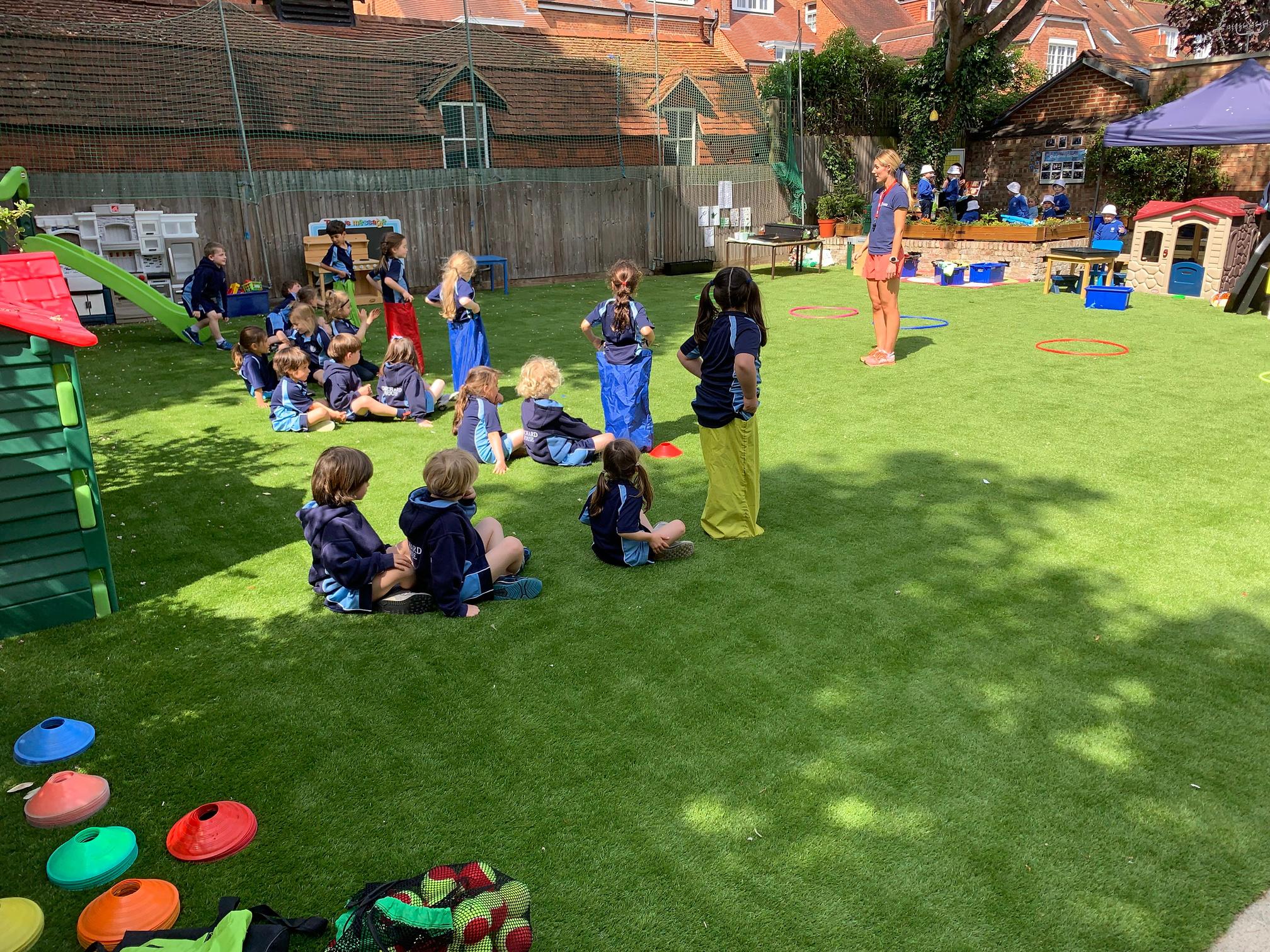
Parachute games
A basic introduction to team games
Listening and repeating key vocabulary and phrases
Encouraging pupils to recall and reproduce simple vocabulary through songs, games and storybooks
Physical Education (PE) French
19

20
Learningtousealaptopandhowtocontrolusingamouse/typing practise Exploringstructurethroughmathematicalsinginggames,andtimbreby lookingatmusicalelementsthroughoursenses. Movementinresponsetomusic Learningandsingingarangeoffamiliarandnewsongs Computing Music/Eurhythmics
Suggested activities to do at Home
Holistic learning has many forms at Orchard House School. We believe there are many activities that you could adopt that support and further develop your child's learning when they are not at school. Please find some of our suggestions below:
Every week, we share with you the ‘Talking Homework’ which outlines the children’s learning for the following week. It provides opportunities for discussions about school at home.

1:1 reading, ensuring comprehension questions are being asked.
Art and creative activities
WOW notes that highlight children’s achievements that can be shared in school Becoming more independent with routines (getting dressed, making own bed)
Table manners and explore healthy eating
Manage own hygiene (toilet and brushing teeth)
Improve coordination when moving around a space/throwing and catching
Write own diaries about their day/weekends
21
TOGETHER WE'RE EXTRAORDINARY








 Mr Kit Thompson Headmater
Mr Kit Thompson Headmater






















